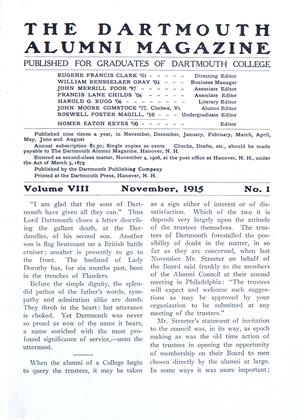The twentieth annual observance of Dartmouth Night by the College in Hanover and the fourth annual observance by alumni associations throughout the country took place on Friday evening, October 8. The local celebration excelled in size that of any previous year, Webster Hall being packed to" its utmost capacity. The entire undergraduate body, visiting alumni, and the alumni of the Medical School marched cheering and singing around the campus and into the auditorium. Further songs and cheers within the hall preceded the more formal exercises of the evening and testified to the spontaneous enthusiasm of those who had gathered "to perpetuate the Dartmouth spirit and capitalize the history of the College."
President Nichols welcomed the Freshman class as newcomers into the great Dartmouth family, and set forth the history and purpose of that family. John R. McLane '07 as the representative of the Alumni Council spoke of the interest which the alumni feel in each new class, and the desire that they have, to see the younger classes at the same time preserving the old Dartmouth ideals of democracy and growing in breadth of interests.
The telegram from the Reverend J. E. Johnson '66, announcing his gifts of $10,000 for the support of the winter carnival and of $5,000 toward the erection of a swimming pool awakened a deafening burst of applause. The undergraduate body outdid its previous earsplitting cheers in two Wah-HooWahs for "Johnny Johnson Sixty-Six, loud enough for him to hear it in Philadelphia."
C. P. Merryman '16 spoke for the undergraduate body, taking as his theme the "old and new Dartmouth." He pointed out the fallacy that many alumni make when they bewail the passing of the old Dartmouth spirit, showing that such alumni are speaking without any knowledge of conditions as they really exist in Hanover today. It is true that a smaller percentage of men now spend every afternoon watching football practice than they did twenty years ago, but the reason for this is not a dying out of interest in College activities but a wider and greater interest in all things that go to make up the varied life of the College. The men who are not on the bleachers at the time of practice are absent because they themselves now have a thousand and one other things to do for the College at that very time. The old spirit showed itself only on an athletic side; the new is better and bigger, for it takes in all activities. And the sum of the whole matter is that there is no old and new—it is all one, though expressing itself in different ways.
Telegrams from the various alumni gatherings throughout the United States and Canada were then read. These messages represented half the states in the Union, but the greatest applause was given to a cable greeting that came from four loyal men who were celebrating Dartmouth Night in Buenos Ayres, Argentina.
Judge W. N. Cohen '79 of New York, the next speaker, expressed his belief that the College was growing ever more democratic, and that the Dartmouth spirit was in no danger of getting old and decrepit. Professor John King Lord for the faculty laid stress on the two challenges of the College to every man who enters,— that of her past and that of her future. Lewis Parkhurst '78 spoke of the duties of the trustees to the College as he sees them, and E. K. Hall '92, in the concluding speech of the evening, defined the differences between the loyalty of Dartmouth men to their alma mater and that of men in other institutions. As always, the exercises closed with the singing of the Dartmouth Song.
 View Full Issue
View Full Issue
More From This Issue
-
 Article
ArticleTHE OCTOBER MEETING OF THE TRUSTEES
November 1915 -
 Article
Article"I am glad that the sons of Dartmouth
November 1915 -
 Article
ArticleTOWARD A NEW LIBRARY BUILDING
November 1915 By Nathaniel L. Goodrich -
 Class Notes
Class NotesCLASS OF 1885
November 1915 By EDWIN A. BAILEY -
 Article
ArticleADDRESS DELIVERED AT THE OPENING OF COLLEGE SEPTEMBER 23, 1915
November 1915 By Ernest Fox Nichols -
 Class Notes
Class NotesLOCAL ASSOCIATIONS
November 1915








